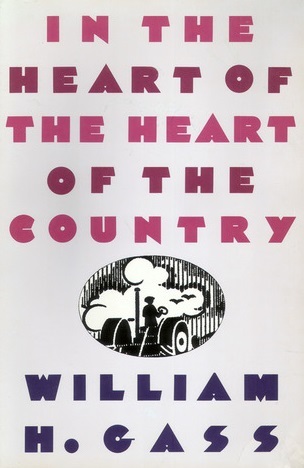
I need to do a better job of reading William H. Gass’s fiction. I’ve enjoyed some of his nonfiction–specifically, On Being Blue and Finding a Form. But his fiction has, until recently, been a blank spot I’ve needed to fill in. I started The Tunnel ages ago and got bogged down; among my reading projects for this year is to finally finish it. On a trip to the west coast, I picked up his collection In the Heart of the Heart of the Country, and devoured it earlier this month. First things first: the novella “The Pedersen Kid” is flat-out stunning, blending a lightly experimental use of language with a slowly building air of menace. Winter landscapes, claustrophobia, repression, and the presence of violence all factor in to this story, which steadily ramps up the tension, maneuvering towards a harrowing conclusion. Elsewhere in the book, pastoral landscapes and formally inventive narrative techniques collide, rarely failing to impress.
The use of the word “devour” above may well have been inspired by my recent reading of Camille DeAngelis’s Bones & All. The protagonist here is a young woman named Maren with the habit of periodically consuming other people: the word “gobble” is used, and quickly becomes impressively sinister. Maren remains sympathetic throughout: she’s been abandoned by her mother and finds herself on a search for her father, a fairly archetypal plot made jarring through, well, the fact that she’d periodically compelled to eat people. It’s impressive and unsettling, and I was reminded repeatedly of Suzy McKee Charnas’s The Vampire Tapestry, another memorable story that explores the isolation felt by someone who regards nearly everyone around them as potential food.
Also in the “recently read” section: two novels from J. David Osborne with wildly varying tones. By The Time We Leave Here, We’ll Be Friends is a surreal, occasionally phantasmagorical story of weird happenings in a gulag in a post-Stalin Soviet Union. It is memorably unsettling, encompassing bleak realism and moments of utterly batshit weirdness. His more recent short novel Black Gum is more restrained, focusing on his central character’s meticulous decline and shift onto the fringes of society. There’s a memorable supporting cast and a tautness to the prose: it’s restrained without losing any of its ability to disorient or to depict occasionally brutal actions.
Follow Vol. 1 Brooklyn on Twitter, Facebook, Google +, our Tumblr, and sign up for our mailing list.
